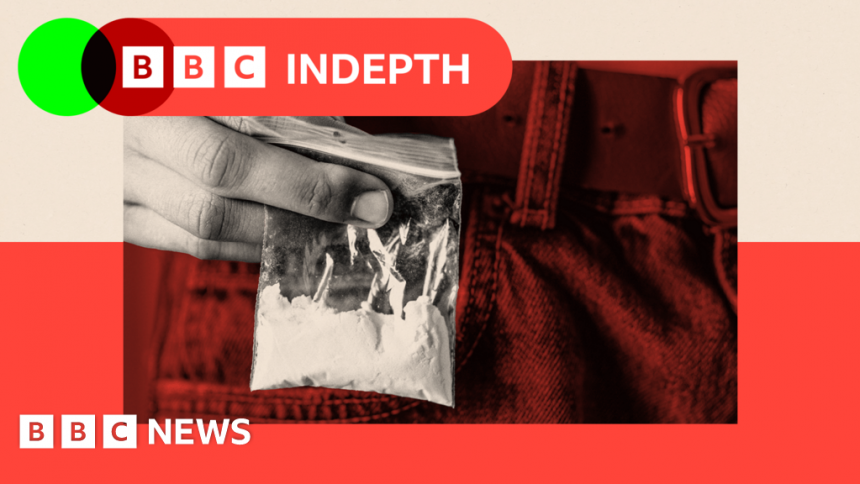Generation K: The disturbing rise of ketamine abuse among young people
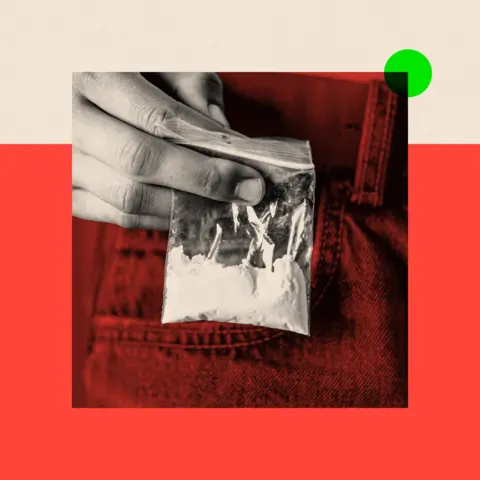 Getty Images
Getty ImagesAt the urology department of Burnley General Hospital, 26-year-old Ryan (not his real name) is having a drug solution inserted through a catheter – part of his treatment for a condition known as ketamine bladder. This procedure will not completely reverse the damage inflicted by Ryan’s previous addiction to the Class B drug, but it will help him manage the symptoms.
Ketamine, a powerful horse tranquiliser and anaesthetic, is a licensed drug and can be prescribed medically. However, when misused, it can cause serious and sometimes permanent damage to the bladder. The hospital is watching Ryan signs of kidney failure, too. He worries about finding a girlfriend and having children. But he is stoical when he talks about passing blood and having to urinate numerous times a day.
“You could not be a ketamine addict for 30 years, 20 years,” he says. “You’d die.”
He is under the care of consultant urologist Haytham Elsakka, who says he has witnessed a rise in young patients whose bladders have been damaged by ketamine use. “Some of them are in their 30s, but most of them are 16 to 24,” says Dr Elsakka. Around half of young patients end up needing surgery, he adds. Other risks from recreational use include liver failure, damage to the urethra, incontinence and impotence.
“We have seen young people under the age of 25 who’ve completely lost control of their bladders, who have had to have surgery, including bladder removal,” says Abigail Wilson, lead clinical pharmacist for national drug and alcohol charity WithYou.
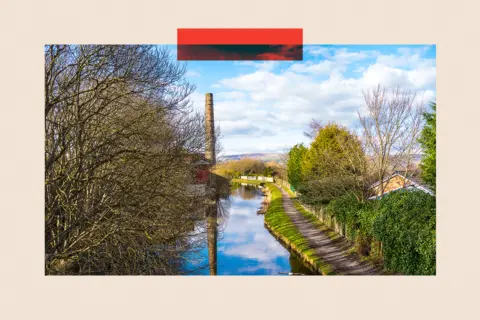 Getty Images
Getty ImagesIn and around the town of Burnley, Ryan is far from alone. Lancashire County Council says it is helping a growing number of families affected by ketamine addiction in the Burnley area. According to WithYou, which runs a ketamine support service for young people aged 11 to 24, the number seeking help across Lancashire increased from 32 in 2018-19 to 123 by the end of 2024.
And the area is not unusual. In England, the number of under-18s entering drug treatment who describe ketamine as one of their problem substances rose from 335 to 917 between 2020-21 and 2023-24, according to the National Drug Treatment Monitoring System.
An anonymised 2023 survey of more than 13,000 secondary schoolchildren from 185 schools across England reported 11% of 15-year-olds had been offered ketamine at some point. The same study, conducted for NHS England, suggested the use of ketamine among schoolchildren had more than doubled in the last decade from 0.4% in 2013 to 0.9% in 2023.
 Getty Images
Getty ImagesThe drug came into the spotlight following the death of Friends actor Matthew Perry aged 54, after which a coroner found ketamine had been the primary cause. Doctors and experts subsequently described how the market for the drug in the US has exploded as it has grown in popularity among Hollywood celebrities.
And thousands of miles away, among ordinary young people in UK towns, ketamine – also known as special K, vitamin K, or kit kat – has also become fashionable. Although highly dangerous, it is often seen as a sociable way to get high, with users buying it in powder form and snorting it.
Now, just 11 years after ketamine was reclassified from Class C to Class B, the UK government is seeking expert advice on whether to make ketamine a Class A drug. This would mean anyone supplying it could be handed a life sentence.
- ‘Ketamine addiction left me crying in pain’
- Hooked on ketamine – Gen Z’s drug of choice
- Ketamine bladder: Special clinics as youth addiction ‘explodes’
But some experts are sceptical this would make much of a difference. While ketamine use appears to be on the rise among the young, there is a sharp divide in opinion around what can be done to halt that.
‘It’s in the schools, it’s in the parks’
One Saturday afternoon in September 2023, the hottest day of the year, a 16-year-old called Preston McNally took ketamine with three friends in Burnley. High on the drug, he fell into the Leeds and Liverpool canal that flows through the town. Preston’s friends had also taken the drug and did not call for help straight away, an inquest was later told.
The coroner said Preston drowned due to ketamine intoxication. The inquest also heard that he had told his sister he was trying to quit just before he died.
Those on the front line are well aware of the scale of the problem. “The amount of mums that have said to me, ‘It’s everywhere’,” says Fr Alex Frost from St Matthews Church in the town. He runs a support group for parents of ketamine users. “It’s in the schools, it’s in the parks.”
Across Lancashire, recorded offences for possession and supply of ketamine rose by nearly 70% from 54 in 2023 to 91 in 2024. “What we have seen, probably within the last 12 months, is the upturn in the use, particularly around children,” says Insp Matt Plummer of Lancashire Police. “Sometimes the parents have no idea.”
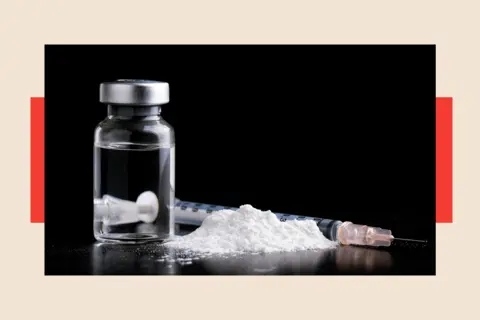 Getty Images
Getty ImagesOnce ketamine was known as a party drug, associated with the club scene. But there’s evidence to suggest that has changed. In a 2024 report into drug trends in Greater Manchester, school-aged children recounted how they used it with friends to “chill” in the local parks or at home.
Those who go on to use it away from social settings are often doing so “to self-medicate unmet mental health support needs such as anxiety and trauma”, says the author of the report, Robert Ralphs, a professor of criminology and social policy at Manchester Metropolitan University.
‘Everybody else is doing it’
One mother, who we are calling Claire, told the BBC she was oblivious to the fact that her 14-year-old daughter Lexi (not her real name) was addicted to ketamine until the teenager ended up in hospital with severe stomach cramps.
Lexi, who lives on a neat, well-cared-for street in Burnley, loved sport and dancing. But after she started secondary school, she says, a friend introduced her to ketamine.
“I knew it was illegal… and it was a horse tranquiliser,” says Lexi. “That’s all I knew. I didn’t really want to do it, but I just thought, well, everybody else is doing it and I didn’t really want to be the odd one out.”
One reason that so many young people are gravitating towards ketamine is they can buy it for pocket-money prices, according to Lexi. “It were easy to get – like, really easy,” she says.
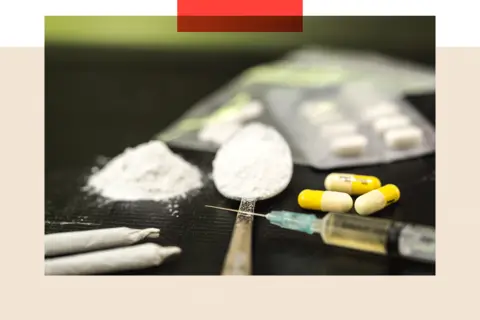 Getty Images
Getty ImagesIn Burnley, friends will chip in for the £15 to £30 it costs for a gram and share it.
To feed her habit, Lexi would ask her mum for a couple of pounds for the bus or some make-up – or sometimes she would steal a £10 note. If Lexi had been coming home drunk or smelling of weed, her mother Claire would have twigged. Claire says: “I was absolutely gobsmacked, just distraught, really, thinking: how did I not know?”
‘You’re doing stupid amounts’
What makes ketamine especially dangerous is that lots of people, particularly young people, wrongly see it as a lower-risk drug, says Mrs Wilson of the WithYou charity.
At lower doses, she says, it has a similar effect to alcohol. “The effects can wear off from about 40 minutes to just over an hour after taking it,” she adds. “If you want to keep those effects, then repeat dosing is required to continue them.”
And this means users’ habits can escalate rapidly, according to Aaron (not his real name), who lives in a small town outside Burnley and took his first snort of ketamine when he was just 16.
“Your tolerance goes up extremely quickly and within the first month you’re doing stupid amounts,” he says. Soon he was spending £200 month on the drug.
Higher doses can lead to a state known as a K-hole, “which is where you become completely detached from reality and also paralysed”, says Mrs Wilson.
Then there is the psychological impact. The WithYou charity is helping Lexi recover from dependence on the drug, but also trauma and self-harm. Once, when she was high, she was the victim of a sexual assault. When kids are on ketamine, they are extremely vulnerable.
‘Extremely dangerous’
Some of the families of ketamine addicts the BBC has spoken to want the drug reclassified as Class A. But this would also mean children caught in possession of ketamine could face up to seven years in jail rather than five. Putting ketamine in the same bracket as heroin and cocaine “may increase the stigma and make young people less likely to discuss their use and seek help”, warns Prof Ralphs.
The government is currently seeking expert advice from the Advisory Council on the Misuse of Drugs (ACMD) on whether the drug should be reclassified. “Ketamine is an extremely dangerous substance and the recent rise in its use is deeply concerning,” says Dame Diana Johnson, the policing minister. “It is vital we are responding to all the latest evidence and advice to ensure people’s safety and we will carefully consider the ACMD’s recommendations before making any decision.”
 Joe Frost
Joe FrostFamilies in the Burnley area say the authorities also need to do more to help those suffering as a result of what Fr Frost calls an “epidemic” of ketamine use.
In response, Lancashire County Council says it is “dedicated to supporting children and young people affected by ketamine use in our community” and that it “will continue to work tirelessly to address the challenges posed by ketamine use and to provide the necessary support to those in need”.
‘The urge is always there’
There is scepticism from those on the frontline that increased enforcement will solve the issue.
“It’s not a case that we can just arrest our way out of the ketamine issue,” says Insp Plummer. “You could arrest 10, 15 people a day for the possession of ketamine if you found them, but it’s not going to change the cycle, particularly with kids.” He adds that generally children caught with ketamine are given informal words of advice and referred for support, not charged.
And some experts query how effective reclassification would be. These include Prof Ralphs, who observes that the 2014 shift from Class C to Class B has not prevented the recent rise in usage among young people. He also suggests that would have no impact on people’s decisions to supply it either, as most ketamine dealers already supply Class A substances as well. He adds that reclassification “will not deter young people from using it if their underlying mental health and wellbeing needs continue to be unmet”.
In the meantime, no one yet knows what the long-term effects will be for children who start taking ketamine at 12, 13 or 14. Community leaders and the families the BBC spoke to say they cannot wait for change, and that urgent action is needed now to try to prevent more young people suffering.
Lexi says she is trying to move forward with her life. Since the doctors at the hospital told Lexi where her life could be heading, she has not used ketamine.
Getting the drug out of her head is still not easy. She insists she will never take another dose of ketamine. But, she says, “the urge is always there for me to do it again”.
If you’ve been affected by the issues raised in this article, help and support is available via BBC Action Line.
Top image credit: Getty Images
BBC InDepth is the home on the website and app for the best analysis, with fresh perspectives that challenge assumptions and deep reporting on the biggest issues of the day. And we showcase thought-provoking content from across BBC Sounds and iPlayer too. You can send us your feedback on the InDepth section by clicking on the button below.



